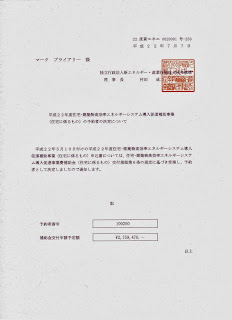It's time to tell the tale of Nedo.
In all areas of commerce we are besieged by offers of things for free, and must beware of spending all our money in their pursuit. The world of house building is no exception, and various bits of free were dangled in front of us, from the "ecopoints" that were eventually not given to us so that our house came close to our budget, to the offer of free insulation that ended up going cold. The Nedo grant was the biggest and most exciting.
Nedo is the New Energy and Industrial Development Organisation. It was set up in 1980, spurred by the oil shocks of the previous decade, and has been developing new energy since. They have an English language website with very different content to the Japanese website, and the organisation seems to function differently domestically and on the international stage. Anyone familiar with Japanese industry will have seen how the local market is used as a test bed full of guinea pigs, where products can be developed to generate income from markets abroad.
Their motives are perhaps more in long-term profits for industry than savings for consumers, but they offered us a grant of 2.7 million yen, which at the time seemed not only a boost to our finances, but an endorsement of what we were doing. The grant never materialised, but it remains as an endorsement of our attempt to solve the energy problem in our own little way, so I'll post it here, framed in cyberspace.
From memory, one criterion for the grant was for energy savings over and above the the next generation energy standards. The initial cost to make those savings had to be less than 100 yen per kWh saved per year. The grant was for up to one third of those costs. A kWh can cost anything from over 40 yen in peak electricity to under 10 yen in paraffin, so this means a payback in the order of ten years.
Our situation was particularly attractive to the company that applied for the grant. One reason was that our old house was really very old and our gas, electricity and heating oil bills set a very high bench mark against which the energy savings would be measured. The other attractive feature was the windows we were planning on using. Their eyes lit up when they saw the U-values, and they did not even blink at the cost. These were people who understood the balance between initial costs of energy efficiency and running costs of heating bills, and knew which way the balance tipped.
The fact that the windows were being imported was not an issue since NEDO is an internationally-minded organisation, actively seeking collaborations with other countries and cutting-edge technology.
The fact that we were not going to be buying our windows through the company that was applying for the grant also did not seem to be a problem, and they were happy to forge an invoice. Perhaps I should have read this as a warning of lack of accountability.
The part the company were interested in was a solar thermal system that supplied domestic hot water in the summer, and heating in the winter. I think practically speaking, the windows made their sums much easier, and contributed more to the energy savings than their system, but I'll write more about that later.
